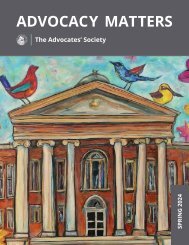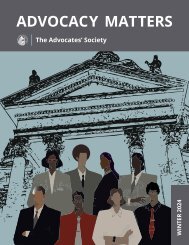Keeping-Tabs-Winter-2024
Stay up-to-date on news and events from our Young Advocates' Standing Committee (YASC) with Keeping Tabs.
Stay up-to-date on news and events from our Young Advocates' Standing Committee (YASC) with Keeping Tabs.
Create successful ePaper yourself
Turn your PDF publications into a flip-book with our unique Google optimized e-Paper software.
LANGUAGE RIGHTS<br />
Adoption of the Act for the Substantive<br />
Equality of Canada’s Official Languages:<br />
Major New Developments in Language Rights<br />
Isabelle Hardy (she/her), Office of the Commissioner of<br />
Official Languages<br />
(Translation of previous article)<br />
Editor’s note: The recent amendments to the Official Languages Act are bringing about many changes in the official<br />
languages landscape in Canada, including those discussed in this article. Other notable amendments include<br />
new obligations for the federal courts to simultaneously publish judgments in English and French, which will come<br />
into force on June 20, <strong>2024</strong>. In respect of those amendments, The Advocates’ Society sent a letter to the federal<br />
government on January 10, <strong>2024</strong>, encouraging it to provide federal courts with sufficient resources to meet these<br />
new obligations. That letter is available here.<br />
Disclaimer: The comments included in this article are those of the author and not those of her employer.<br />
The federal language rights landscape has undergone<br />
significant change since Bill C-13, An Act for<br />
the Substantive Equality of Canada’s Official Languages,<br />
received Royal Assent 1 on June 20, 2023. This<br />
act makes substantial amendments to the Official<br />
Languages Act [“OLA”], 2 three of which are discussed<br />
in this article: the emphasis on substantive equality,<br />
changes to the administration of justice and the<br />
judicialization of the Commissioner of official Languages’<br />
powers.<br />
The OLA specifies, once and for all, that “the<br />
norm for the interpretation of language rights is<br />
substantive equality.” These rights must be given<br />
“a large, liberal and purposive interpretation” and<br />
must be interpreted “in light of their remedial character.”<br />
3 As a whole, the OLA makes clear the need<br />
to take into account, including in interpreting language<br />
rights, the fact that French is in a minority<br />
situation in Canada due to the predominant use of<br />
English. In other words, substantive equality is the<br />
aim – in law and in practice.<br />
With respect to the administration of justice, as<br />
evidenced by the most recent appointments to the<br />
Supreme Court of Canada, section 16 of the OLA<br />
has been revised to include (in fact, to no longer<br />
exclude) the Supreme Court of Canada among the<br />
federal courts required to hear cases in both official<br />
languages without the assistance of an interpreter.<br />
Requiring that courts understand both official<br />
languages means ensuring that courts have bilingual<br />
institutional capacity. This is the purpose of the<br />
new subsection 16(3) of the OLA, which imposes an<br />
obligation on the federal government to ensure,<br />
in the context of appointments to federal courts,<br />
that these courts are able to meet their obligation<br />
to hear cases in both official languages without the<br />
assistance of an interpreter.<br />
Beyond the federal courts, the new section 16.1<br />
of the OLA requires the federal government to take<br />
into account the importance of equal access to justice<br />
in both official languages when appointing superior<br />
court judges across the country. Candidates<br />
seeking appointment to the bench must indicate<br />
their level of language proficiency and expect the<br />
Office of the Commissioner for Federal Judicial Aff-<br />
17<br />
17

















